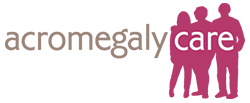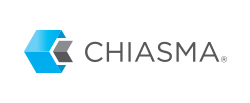Chiasma Supports Acromegaly Awareness with Launch of New Online Resource for Patients and Caregivers
– November 1 is Acromegaly Awareness Day –
Newton, Mass., October 30, 2015
– Chiasma, Inc. (Nasdaq: CHMA), a late-stage biopharmaceutical company, today unveiled a new online resource to support people with the rare pituitary disorder acromegaly. This announcement coincides with Acromegaly Awareness Day on November 1, 2015.
The online resource, Acromegaly.care, is an educational website that provides practical information and tools for patients and their loved ones. The website seeks to shed light on the challenges of living with acromegaly. Acromegaly.care was created with input from a diverse group of acromegaly patients and advocates, whose stories are told in videos, photos and written essays on the site.
Photo Gallery
“Raising awareness for acromegaly and providing access to real-life patient stories can aid with early diagnosis and help people cope with the physical and emotional aspects of acromegaly,” said Jill Sisco, president of the Acromegaly Community, a patient advocacy and information organization. “Patients are excited to access this new resource for acromegaly – a complicated and burdensome disease.”
Today is #Acromegaly Awareness Day. Find patient stories at www.acromegaly.care. #acromegalycare Tweet
Most acromegaly patients (91 percent) experience acromegaly-related symptoms (such as headaches, excess sweating and joint pain) that substantially interfere with their daily life and work, according to a recent patient satisfaction survey co-authored by Sisco.
“Acromegaly is a challenging disease to manage, and treatment options are limited,” said Shlomo Melmed, M.D., senior vice president and dean, Cedars-Sinai Medical Center, Los Angeles. “I’m encouraged to see a resource dedicated to generating greater awareness for this disease and providing practical tools to help patients partner with their medical team.”
Acromegaly.care is intended for educational purposes only. It is not intended to provide medical advice. Every individual's medical situation is different, so any questions should be directed to a healthcare professional.
About Acromegaly
Acromegaly typically develops when a benign tumor of the pituitary gland produces too much growth hormone (GH), ultimately leading to significant health problems and early death if untreated. Common features of acromegaly are facial changes, intense headaches, joint pain, impaired vision and enlargement of the hands, feet, tongue and internal organs. Serious health conditions associated with the progression of acromegaly include type 2 diabetes, hypertension, respiratory disorders, and cardiac and cerebrovascular disease.
Current treatment options include surgery to remove the pituitary tumor, radiation therapy which destroys any lingering tumor cells and/or medical treatment in cases where these approaches are not possible or fully effective. Today’s medical treatments include dopamine agonists, GH antagonists and injectable somatostatin analogs, the current standard of care. Currently available somatostatin analogs require large needles for injections into muscle (octreotide) or deep into the tissue underlying the skin (lanreotide).
According to the U.S. National Institutes of Health, acromegaly occurs in approximately 60 people per million in the U.S. In addition, researchers estimate that three to four out of every million people develop acromegaly each year.1 Because symptoms often develop slowly, diagnosis may be delayed by years or decades, making it difficult to determine the total number of people with the disease.
About Chiasma
Chiasma is a late-stage biopharmaceutical company focused on improving the lives of patients suffering from orphan diseases by developing and commercializing novel oral forms of therapies that are available today only by injection. The Company’s lead product candidate is Mycapssa™ (octreotide capsules), a new investigational drug for the orphan condition acromegaly, developed with the Company’s Transient Permeability Enhancer (TPE®) technology to facilitate gastrointestinal absorption of unmodified drug into the bloodstream safely. Mycapssa™ has not been approved for use in any jurisdiction. Using TPE® technology, Chiasma is evaluating additional proteins, peptides and small molecule drugs that are currently only available by injection, but could potentially be converted to oral delivery. TPE® technology is potentially well suited for drugs with chronic indications, where frequent dosing is required and the need for an oral alternative is greatest. Chiasma is a Delaware corporation with a wholly owned Israeli subsidiary.
Additional information can be found at www.ChiasmaPharma.com.
Forward-Looking Statements
This release contains "forward-looking statements" within the meaning of the Private Securities Litigation Reform Act of 1995, including statements regarding the treatment of acromegaly. Any forward-looking statements in this press release are based on management's current expectations of future events and are subject to a number of risks and uncertainties that could cause actual results to differ materially and adversely from those set forth in or implied by such forward-looking statements. These risks and uncertainties include, but are not limited to: risks associated with the regulatory review process generally; the risk that the FDA may determine that the data included in the Company’s NDA are insufficient for approval and that we must conduct additional clinical trials, or nonclinical or other studies, before oral octreotide can be approved; the risk that the results of previously conducted studies involving oral octreotide or other product candidates will not be repeated or observed in ongoing or future studies or following commercial launch, if such product candidates are approved; risks associated with obtaining, maintaining and protecting intellectual property; risks associated with Chiasma's ability to enforce its patents against infringers and defend its patent portfolio against challenges from third parties; the risk that oral octreotide, if approved, will not be successfully commercialized; the risk of competition from currently approved therapies and from other companies developing products for similar uses; risk associated with Chiasma's ability to manage operating expenses and/or obtain additional funding to support its business activities; and risks associated with Chiasma's dependence on third parties, including with respect to the manufacture of commercial supply in anticipation of commercial launch, if oral octreotide is approved. For a discussion of these and other risks and uncertainties, and other important factors, any of which could cause our actual results to differ from those contained in the forward-looking statements, see the section entitled "Risk Factors" in the final prospectus related to Chiasma's initial public offering filed with the Securities and Exchange Commission pursuant to Rule 424(b) of the Securities Act of 1933, as amended, as updated by Chiasma’s subsequently filed Quarterly Report on Form 10-Q and Chiasma’s other SEC filings as well as discussions of potential risks, uncertainties and other important factors in Chiasma's subsequent filings with the Securities and Exchange Commission. All information in this press release is as of the date of the release, and Chiasma undertakes no duty to update this information unless required by law.
Contacts
Media:
Carolyn Sobczyk
JPA Health Communications
(202) 591-4052
[email protected]
Investors:
Jason Fredette
Chiasma, Inc.
(617) 928-5306
[email protected]
1 National Endocrine and Metabolic Diseases Information Service (NEMDIS); A service of the National Institute of Diabetes and Digestive and Kidney Diseases (NIDDK), National Institutes of Health (NIH)







